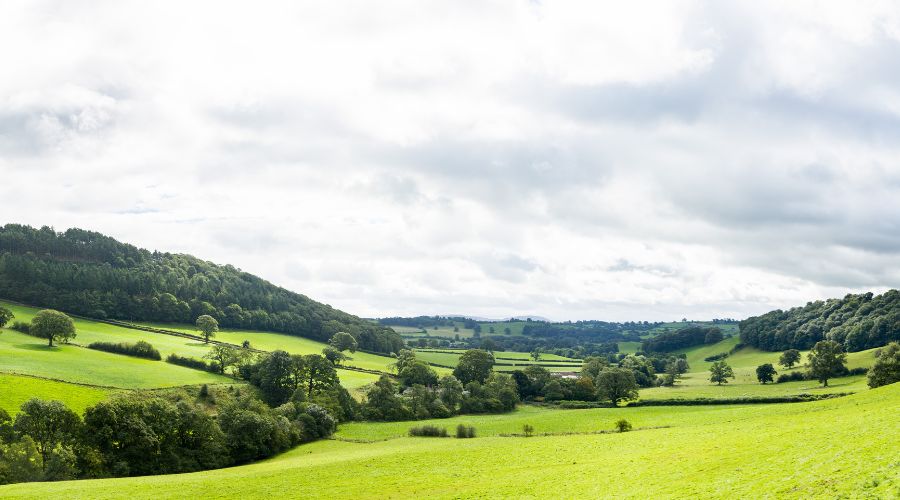Welsh farming community responds to updated Sustainable Farming Scheme outline
26th November 2024
Updated proposals for the Sustainable Farming Scheme (SFS), which is the primary source of government support for the future of Welsh farming starting in 2026, have been warmly welcomed by the Welsh farming community.

The Sustainable Farming Scheme Outline sets out the Welsh Government’s interim position following an intense programme of meetings with farming organisations and wider stakeholders over the summer months and into the autumn.
Revised proposals include:
- Removing the scheme rule to have 10% tree cover. This is replaced with a new Universal Action requiring an undertaking for a tree planting and hedgerow creation opportunity plan. The set figure for tree cover has been replaced with a scheme-wide target that will be set after discussions with the Ministerial Roundtable.
- Merging the three Animal Health, Welfare and Biosecurity actions into a single simplified action
- Making payments at the Universal Layer on Sites of Special Scientific Interest (SSSI)
- Including grazing rights on common land within the Universal Payment
- Reducing the overall number of Universal Actions from 17 to 12.
Farmers at the heart of communities across Wales
In making the announcement from the Royal Welsh Winter Fair, the deputy first minister, Huw Irranca-Davies MS, said: “Following the consultation, it was clear changes were needed – we said we would listen – and we’ve done just that.

“Farmers are at the heart of communities right across Wales, and they play a crucial role in our economy and food production. As stewards of our land, they also have a key role to play in protecting and restoring nature and tackling the climate emergency.
“I am pleased to be able to publish a revised scheme outline today, which sets out the significant progress we have made through collaboration with the Roundtable.”
The deputy first minister added that while the progress is significant, this is not the final scheme. The final scheme decision will be made next summer, based on further discussions at the Ministerial Roundtable and evidence including the economic analysis and impact assessment.
He continued: “We are developing a scheme which is designed to support all farmers in Wales, based on the completion of a set of Universal Actions. These Actions will be familiar to farmers in Wales, whether beef, dairy, arable, upland, lowland, extensive or intensive. They are actions many of them take on a day-to-day basis.
“I remain committed to listening to and working with our stakeholders to ensure the final scheme we deliver next year is a scheme that will help support the economic resilience of farming businesses, the sustainable production of food, our climate and nature objectives, and our rural communities for current and future generations
“I believe the changes set out today to the scheme outline will make the scheme available to all farmers who wish to participate and strengthen the scheme’s contribution to our climate and nature commitments.
“We’ve come a long way – and there is still more work to do.”
‘The scheme must work for all active farmers’
NFU Cymru president Aled Jones said that he welcomes the “partnership approach” the deputy first minister has put in place to listen to the concerns of the farming industry.
He added: “NFU Cymru is pleased that Welsh Government has committed to undertake economic analysis and an impact assessment of the revised proposals to understand what the scheme will mean for farmers and wider society.
“This work is vital and NFU Cymru remains clear that the SFS should provide the same level of stability to farm businesses, our rural communities and the supply chain as the Basic Payment Scheme does currently.
“There is much more work to do in the coming months on the final scheme detail as well as a number of fundamental aspects of scheme design including the payment methodology and payment rates ahead of the publication of the final scheme, expected in July 2025,” he continued.
Mr Jones said that securing the Welsh Government’s commitment to a “well-funded, multi-annual budget for the scheme” that matches the scale of the union’s ambition for sustainable growth of the food and farming sector, alongside the delivery of key environmental outcomes for society is also going to be crucial.
“We have seen the budget for farming eroded by inflation and subjected to in-year cuts. The need to restore and enhance the budget cannot be overstated.
“NFU Cymru has long been clear that the scheme must work for all active farmers – all farming sectors and all land types in Wales, including those who do not own the land that they farm and those with common land. Ultimately, delivery of the scheme objectives, including actions for climate and nature, is reliant on designing a scheme that all farmers in Wales are able to participate in. “
In conclusion, NFU Cymru president said: “Today marks an important step forward in the development of the SFS. Whilst there remains a huge amount of work to be done on many aspects of the scheme, including the detail under each Universal Action and payment rates, I am confident that if we continue to work in partnership the SFS can help to deliver on our ambitions for food, nature, climate and communities.”
‘We need to be supported fairly’
The Nature Friendly Farming Network (NFFN) Cymru has cautiously welcomed the Welsh Government’s updates to the SFS. The farmer-led organisation said it was “broadly supportive” of the changes.
NFFN Cymru has stressed the urgent need for the Welsh Government to increase its spending on rural affairs and farming. It emphasised that greater investment is essential to meet environmental and climate obligations and to ensure the SFS effectively supports both nature and agriculture.
NFFN Cymru manager Rhys Evans said: “Overall, the changes to the SFS are broadly positive. We welcome the retention of the 10% habitat requirement, which has been a key priority for us. Habitats can include hay meadows, herbal leys, marshy grasslands, hedgerows, wood pasture and unimproved ffridd or hill land, all of which contribute towards food production in Wales and can help improve farm business resilience.
“Tree planting on farms should be guided by the principle of planting the right tree in the right place for the right reason. We had concerns that mandatory tree cover policies might lead to unintended outcomes, such as losses of biodiversity or food production. Therefore, we welcome the flexibility for farmers to work with advisors to draw up tree planting and hedgerow creation plans which suit them.
“However, it is crucial that the SFS is adequately funded to ensure its effectiveness. In particular, the Optional and Collaborative layers, which are the most ambitious and hold the greatest potential for benefiting nature, need sufficient investment. Payment rates must reflect the value of these measurements. Without proper funding, ambitious plans, like those for agroforestry, risk staying on paper instead of becoming reality.
“As farmers we are being asked to deliver numerous outcomes: food production, climate change mitigation, nature recovery, reducing flood risk, access and recreation opportunities, as well as being the cornerstone of rural communities, economies and the Welsh language. We are more than ready to deliver, but we need to be supported fairly to do so.”
Read more farm business news.
